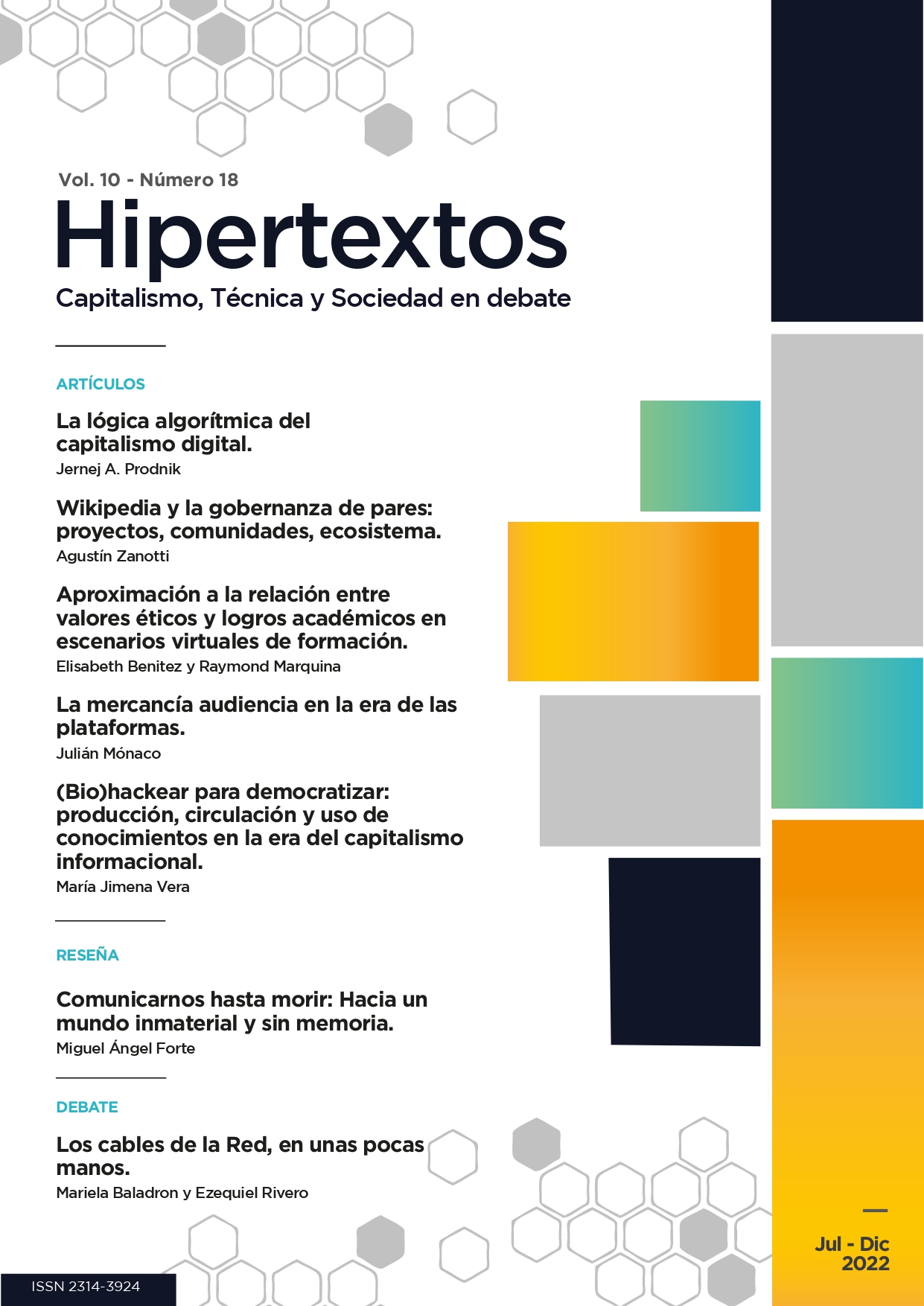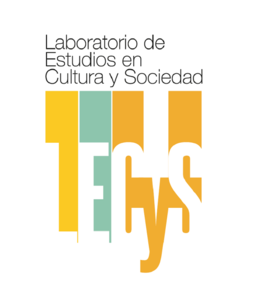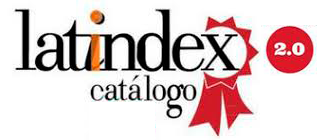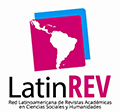Approach to the relationship between ethical values and academic achievement in virtual training programs
DOI:
https://doi.org/10.24215/23143924e057Keywords:
ethical values, virtual training scenarios, virtual education, social representations, social imaginariesAbstract
The purpose of this work is to determine(establish) the relationship between ethical values and academic achievements in virtual education scenarios from an investigation of the concurrent social representations in the social imaginary, analyzing the narrative discourse of the students of the Social Communication career at the University of The Andes in Merida Venezuela. We have oriented the research, after 2 years of the forced start of online activities due to the COVID 19 pandemic, to the ethos of undergraduate students who take their courses through the use of virtual classrooms on the Moodle platform, given that the Unexpected transition from in person to virtual, coupled with the circumstances of the country's reality, have impacted the student sector in different dimensions from not giving up education to actually achieving academic success. To do this, we have used the qualitative, ethnographic, descriptive research methodology, based on a bibliographic design, applying an open, unstructured questionnaire online, to an intentional and non-probabilistic sample of the population of students belonging to the Career of Social Communication of the School of Audiovisual Media o the University of the Andes from 2nd to 4th year, from which the lexicometric analysis (analyze, categorize and select) of the discourse could be carried out, to verify the collective construction of the corpus of values that allowed proceeding through the graphic representation of the ethical values to the design of a text cloud, in which the social imaginary was identified as a description tool, and later to study the results and contrast them with the theoretical positions generating a reflection inherent to the role that these values have in regards the achievement of the academic success of the undergraduate students in the relationship dynamics in virtual education.
Downloads
References
Abarca, M. Gómez y Covarrubias M. (2015) Análisis de los factores que contribuyen al éxito académico en estudiantes universitarios. Revista Internacional de Educación y Aprendizaje, 2, (2).
Bustos G, E. (2017). Argumentando los derechos de los no humanos: el caso de la ética de la información de L. Floridi. Revista Iberoamericana De Argumentación, 6. https://revistas.uam.es/index.php/ria/article/view/8191
Bourdieu, P. (1987/2007). Espacio social y poder simbólico en: Bourdieu, Pierre. Cosas Dichas, Barcelona: Gedisa.
Castariodis, C. (1983). Institución Imaginario de la Sociedad. España, Tusquets.
Castoriadis, C. (1997). El imaginario Social instituyente. Zona Erógena. Nro 35. http://www.ubiobio.cl/miweb/webfile/media/267/Castoriadis%20Cornelius%20-%20El%20Imaginario%20Social%20Instituyente.pdf
Cegarra, J. (2012). Fundamentos Teórico-Epistemológicos de los Imaginarios Sociales. Cinta de moebio, 1(13).
Cero, E. t. (2018). Cómo crear una nube de tags y sus usos en el aula. https://revista.educaciontrespuntocero.com/
Conill, J. (2005). La irrealidad como realidad virtual en la tradición Filosófica española (desde unamuno y ortega a Zubiri y marías) Quaderns de filosofia i ciència, 35, 65-77.
Ciceron. (1960). Tusculanas ed. G. Fohlen. Les Belles Lettres.
Chica, F. (2009). La concepción de la entidad virtual desde la perspectiva de la inteligencia. Itinerario Educativo, 157-175.
Cortés, J., Silva, A. y Sandoval, M. (2019). Aplicación móvil adaptativa a entornos web para la gestión del tiempo y el desarrollo de la autoeficacia en estudiantes de programas en educación a distancia y virtual. En E. Serna, Investigación Formativa en Ingeniería (pp. 13-21). Medellín: Instituto Antioqueño de Investigación.
Cortina, A. (1997). El mundo de los valores. Editorial Buho. LTDA. Bogota.
Floridi, L. (2014). The Fourth Revolution. How the Infosphere is Reshaping Human Reality. Oxford, RU: Oxford University Press.
Deci, E. y Ryan, R. (1985). The general causality orientations scale: Self-determination in personality. Journal of Research in Personality, 19 (2),109-134. https://doi.org/10.1016/0092-6566(85)90023-6
Duart, M. (2017). Educar en Valores en entornos virtuales de aprendizaje: realidades y mitos. Revista Apertura, 2. https://www.uoc.edu/dt/20173
Durand, G. (1994/2000). Lo imaginario. Barcelona: Ediciones del Bronce.
García Canclini, N. (1997). Imaginarios Urbanos. Buenos Aires: Eudeba.
García, M. (1992). Lecciones preliminares de Filosofía. Editores mexicanos unidos.
Gardner, H. (1998). A Reply to Perry D. Klein's 'Multiplying the problems of intelligence by eight. Canadian Journal of Education, 23 (1), 96-102. https://doi.org/10.2307/1585968
Gómez, P. (2001). Imaginarios sociales y análisis semiótico. Una aproximación a la construcción narrativa de la realidad. Cuadernos revista de la facultad de humanidades y ciencias sociales, 17, 195-209.
Guzmán, J. (2018). Relación entre la actitud hacia el aprendizaje en línea y la educación virtual. http://repositorio.unsa.edu.pe/handle/UNSA/8316
Ibáñez, F. (2020). Educación en línea, Virtual, a Distancia y Remota de Emergencia, ¿cuáles son sus características y diferencias? Observatorio de Innovación Educativa, Tecnológico de Monterrey (México). https://observatorio.tec.mx/edu-news/diferencias-educacion-online-virtual-a-distancia-remota
Lévy, P. (1998). ¿Qué es lo virtual? Paidos. Barcelona.
Linares Salgado, J. (2018). La subjetividad en la era de las redes sociales. SCIO. Revista de Filosofía, 15, 123-155.
Magaz, M. (2008). La virtualización – Apuntes sobre el libro de Pierre Levy. https://bit.ly/2E1gHci
Moscovici, S. (1961/1979). El psicoanálisis, su imagen y su público, Huemal. Buenos Aires.
Moscovici, S. (1981). On social representation. En J. P. Forgas (Comp.), Social cognition. Perspectives in everyday life, Academic Press. Londres.
Moscovici, S. (1984). The phenomenon of social representations. En R. M. Farr y S. Moscovici (Comps.), Social Representations, Cambridge University Press. Cambridge.
Ortiz, K. y Castañeda, G. (s.f.). Obtenido de La transformación de los imaginarios en educación virtual. https://bit.ly/2E1gHci
Orosco Fabián, J. R. (2015). Valores virtuales. Horizonte de la Ciencia, 5(9), 86–94. https://revistas.uncp.edu.pe/index.php/horizontedelaciencia/article/view/258
Pérez Freire, S. (2017). Situando los imaginarios sociales: aproximación y propuestas. Imagonautas, 7(9), 1–22. https://revistas.usc.edu.co/index.php/imagonautas/article/view/36
Recalde, H. E. (2020). La educación en valores influye en el rendimiento académico del proceso enseñanza - aprendizaje de los estudiantes de la Facultad de Odontología de la Universidad de las Américas de la ciudad de Quito. Universidad internacional de la Rioja. Ecuador.
Silva, A. (2006). Imaginarios Urbanos. Bogotá. Arango editores.
Torbay, G. (2021). Educación Virtual vs Enseñanza Remota de Emergencia semejanzas y diferencias. Universidad Católica Andrés Bello. https://www.ucab.edu.ve/wp-content/uploads/2021/11/EV-vs-ERE-AV.pdf
Viégas, F. y Wattenberg, M. (2008). Timelines tag clouds and the case for vernacular visualization. Interactions, 15 (4), 49-52.
Downloads
Published
How to Cite
Issue
Section
License

This work is licensed under a Creative Commons Attribution-NonCommercial-NoDerivatives 4.0 International License.
























